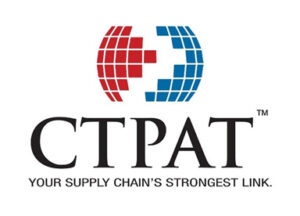Global Standards Assurance (GSA)
CTPAT: Customs Trade Partnership
against Terrorism
Fortify global trade, mitigate risks, and ensure
seamless compliance in today’s dynamic business landscape.
WHAT IS CTPAT
 Customs Trade Partnership Against Terrorism (CTPAT) is a voluntary program initiated by the U.S. Customs and Border Protection (CBP). It focuses on enhancing the security of the international supply chain by encouraging businesses engaged in global trade to implement robust security measures. Participants, including importers, exporters, and manufacturers, undergo thorough security assessments covering aspects like physical security, access controls, personnel security, procedural security, and information technology security. By meeting these criteria, companies can attain CTPAT certification and enjoy benefits such as expedited customs procedures and reduced inspection times at U.S. ports of entry, fostering a more secure and efficient global trade environment.
Customs Trade Partnership Against Terrorism (CTPAT) is a voluntary program initiated by the U.S. Customs and Border Protection (CBP). It focuses on enhancing the security of the international supply chain by encouraging businesses engaged in global trade to implement robust security measures. Participants, including importers, exporters, and manufacturers, undergo thorough security assessments covering aspects like physical security, access controls, personnel security, procedural security, and information technology security. By meeting these criteria, companies can attain CTPAT certification and enjoy benefits such as expedited customs procedures and reduced inspection times at U.S. ports of entry, fostering a more secure and efficient global trade environment.
BENEFITS OF CTPAT CERTIFICATION
Expedited Processing
CTPAT-certified companies often experience expedited processing of their shipments.This can lead to faster clearance of goods through customs, reducing delays and improving overall supply chain efficiency.
Reduced Customs Inspections
CTPAT certification is an indication that a company has implemented strong security measures in its supply chain. As a result, certified companies may be subject to fewer customs inspections, saving time and resources.
Improved Supply Chain Security
Participation in the CTPAT program encourages companies to assess and enhance their supply chain security measures which helps to protect against potential security threats, safeguarding the integrity of the entire supply chain.
Enhanced Business Reputation
CTPAT certification is a recognized symbol of a company's commitment to supply chain security. This can enhance the company's reputation in the industry and among trading partners.
Access to Training and Resources
CTPAT-certified companies have access to training and resources provided by CBP. This support can help companies stay informed about evolving security practices and compliance requirements.
Competitive Advantage
CTPAT certification can serve as a competitive advantage in the marketplace. Some customers and business partners may prefer to work with certified companies, viewing them as reliable and secure partners in the international trade network.
HOW CTPAT WORKS

Voluntary Participation
Companies interested in participating in CTPAT voluntarily join the program.

Application Process
Companies begin by submitting an application expressing their interest in joining CTPAT.

Security Profile
The company is required to develop and submit a security profile that details its security practices and measures.

Corrective and Preventive Actions
Address non-conformities and implement corrective actions to prevent recurrence.

Validation Process
CBP may conduct an on-site validation to verify that the security measures described in the security profile are effectively implemented.

Certification
Upon successful completion of the validation process, the company may be granted CTPAT certification.
HOW WE CAN HELP
- Work with security experts to help implement and review security measures in your supply chain.
- Ensure thorough and accurate documentation of security measures implemented in your organization.
- Provide training to employees on security awareness, recognizing potential threats, and reporting procedures.
- Regularly assess and enhance the physical security infrastructure in accordance with CTPAT requirements.
- Collaborate with supply chain partners, including suppliers, manufacturers, and logistics providers, to ensure a unified approach to security.
- Establish a culture of continuous improvement by regularly reviewing and updating security procedures.
- Stay informed about changes in CTPAT requirements and adjust your security program accordingly.
- Actively engage with CBP representatives to seek guidance and clarification on CTPAT
- Conduct regular self-assessments to evaluate the effectiveness of your security measures.
- Develop and regularly update emergency response plans to address potential security incidents.
WHY GLOBAL STANDARDS ASSURANCE ( GSA)
Customized Solutions
Tailor security measures with precision to meet the unique needs of each client's operations, demonstrated through a portfolio of dozens of diverse businesses served.
Efficiency and Time Savings
Expedite the CTPAT certification process, reducing the typical timeline by 25%, resulting in significant time and resource savings for our clients.
Comprehensive Risk Assessments
Offer in-depth risk assessments that can identify and address potential vulnerabilities significantly enhancing overall supply chain security.
Documentation Management
Provide state-of-the-art documentation management services, reducing administrative workload for our clients.
Training Programs
Deliver award-winning training programs for employees participating in CTPAT-related security awareness training.
Regulatory Compliance Assistance
Demonstrate an in-depth understanding of and ability to navigate regulatory requirements beyond CTPAT, providing comprehensive compliance support.
FREQUENTLY ASKED QUESTIONS
CTPAT, or the Customs-Trade Partnership Against Terrorism, is a voluntary program led by the U.S. Customs and Border Protection (CBP) aimed at enhancing the security of the global supply chain. Businesses that participate in CTPAT commit to implementing and maintaining strong security measures, reducing the risk of terrorism-related threats. CTPAT is crucial for businesses as it can lead to benefits such as expedited processing of shipments, reduced customs inspections, and improved collaboration with government agencies.
To become CTPAT certified, your company needs to follow these general steps:
- Submit an application expressing interest in CTPAT participation.
- Undergo a risk assessment conducted by CBP.
- Develop and submit a security profile outlining your company’s security measures.
- Participate in a validation process, which may include an on-site visit by CBP.
- Upon successful validation, your company may receive CTPAT certification.
CTPAT requires companies to implement a range of security measures across their supply chains, including:
- Physical security enhancements such as access controls and surveillance systems.
- Personnel security measures, including background checks and training programs.
- Information technology security practices to safeguard sensitive data.
- Regular risk assessments and vulnerability identification.
- Collaboration with supply chain partners to ensure a unified and secure approach.
CTPAT certification offers several advantages, including
- Expedited processing of shipments at the border, leading to faster clearance.
- Reduced customs inspections, saving time and resources.
- Priority treatment during inspections when required.
- Improved supply chain security, protecting against potential threats.
- Enhanced business reputation as a secure and reliable trade partner.
CTPAT-certified companies typically undergo revalidation every two to four years, although the specific timeframe may vary.


